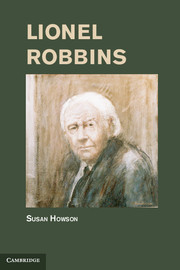Book contents
- Frontmatter
- Contents
- Illustrations
- Abbreviations
- Introduction
- One Father and Son
- Two The Great War
- Three Postwar
- Four The London School of Economics
- Five Iris Gardiner
- Six New College Oxford
- Seven The Young Professor
- Eight Fritz and Lionel
- Nine The School in the Mid-1930s
- Ten The Approach of War
- Eleven The Economics of War
- Twelve Director of the Economic Section
- Thirteen Anglo-American Conversations
- Fourteen The Law Mission and the Steering Committee
- Fifteen 1 9 4 4
- Sixteen The Last Months of the War
- Seventeen The Postwar Settlement
- Eighteen Return to the School
- Nineteen The End of the Transition
- Twenty LSE in the Early 1950s
- Twenty-One Chairman of the National Gallery
- Twenty-two Lord Robbins
- Twenty-three The Robbins Report
- Twenty-four The Sixties
- Twenty-five The Arts
- Twenty-six The Troubles at LSE
- Twenty-seven Retirement
- Conclusion
- Bibliography
- Index
Seventeen - The Postwar Settlement
Published online by Cambridge University Press: 07 October 2011
- Frontmatter
- Contents
- Illustrations
- Abbreviations
- Introduction
- One Father and Son
- Two The Great War
- Three Postwar
- Four The London School of Economics
- Five Iris Gardiner
- Six New College Oxford
- Seven The Young Professor
- Eight Fritz and Lionel
- Nine The School in the Mid-1930s
- Ten The Approach of War
- Eleven The Economics of War
- Twelve Director of the Economic Section
- Thirteen Anglo-American Conversations
- Fourteen The Law Mission and the Steering Committee
- Fifteen 1 9 4 4
- Sixteen The Last Months of the War
- Seventeen The Postwar Settlement
- Eighteen Return to the School
- Nineteen The End of the Transition
- Twenty LSE in the Early 1950s
- Twenty-One Chairman of the National Gallery
- Twenty-two Lord Robbins
- Twenty-three The Robbins Report
- Twenty-four The Sixties
- Twenty-five The Arts
- Twenty-six The Troubles at LSE
- Twenty-seven Retirement
- Conclusion
- Bibliography
- Index
Summary
One morning after the election of the Labour government Lionel Robbins addressed the following minute to James Meade (nd, Correspondence, RP):
Dear James
I am sorry to have to report that my dream life with the senior civil servants has become active again. Lest there should be in it anything of relevance to the routine business of the Section, I hasten to put the salient features on record:-
An important meeting at Downing Street. The old Prime Minister is taking his farewells. Sir Edward Bridges, Sir Norman (then Mr) Brook, Sir Arthur Street, Mr James Meade, Mrs Churchill in attendance. The occasion of the meeting is to consider a draft paper entitled Why say Phut to the British Empire? which the old man has drawn up as his last will & testament. We open the paper eagerly. It is newly printed on sumptuous green in foreign office type. We are disappointed with the contents.
One of the main features is a scheme for exhibiting on an enormous green blackboard the estimates of pessimistic statisticians who have been wrong in the past. You remonstrate with the great man who allows himself to be convinced. He is in immense good humour. He struts about, joking with Clemmie & releasing great puffs of smoke all over the room. ‘You don't seem to like my paper, Mr. Brook’ he questions impishly looking at Norman who has collapsed into the most terrible gloom at the prospect of the release of so damaging a document. ‘Well, Prime Minister,’ replies that faithful secretary, ‘I did wonder whether it was altogether fortunate that your last specimen of official prose should end with such a dying fall.’ The literary allusion pleases the ex-Prime Minister. He roars with laughter and makes jokes at his own expense with everybody.
The scene changes. Sir Edward, Sir Arthur & Sir Norman withdraw. The Economic Section reinforced with Mr. Frank Lee & Mr. Kenneth Goschen [Treasury], with the bland smile of Mr. Robert Brand in the background, are engaged upon a dark & dreadful enterprise entitled Operation White Knight. The object is to lure Sir W. Eady into a dark room and there spiflicate him, pouring flour over his head & clanking chains on the floor to increase the terror of the atmosphere. The operation is completely successful. Everyone (except Sir W.E.) is very pleased.
- Type
- Chapter
- Information
- Lionel Robbins , pp. 587 - 641Publisher: Cambridge University PressPrint publication year: 2011

